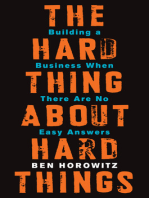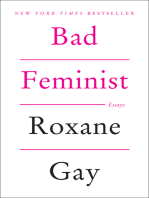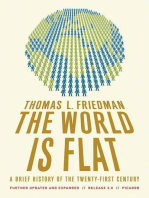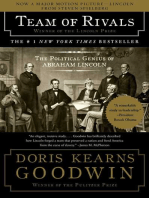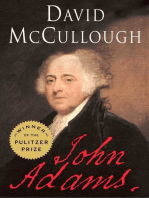So and Neither Grammar
So and Neither Grammar
Uploaded by
Alexis YepezCopyright:
Available Formats
So and Neither Grammar
So and Neither Grammar
Uploaded by
Alexis YepezOriginal Title
Copyright
Available Formats
Share this document
Did you find this document useful?
Is this content inappropriate?
Copyright:
Available Formats
So and Neither Grammar
So and Neither Grammar
Uploaded by
Alexis YepezCopyright:
Available Formats
'So do I' and 'neither do I'
To reflect positive or negative agreement correctly you must REFLECT the auxiliary of the original
statement in your response. I use 'so do I' to say that a positive sentence is also true for me and I use
'neither do I' to say that a negative sentence is also true for me:
1. John: I hate mushrooms.
Me: So do I (=I also hate mushrooms).
2. Lucy: I can’t cook.
Me: Neither can I (=I also cannot cook).
3. Me: Elizabeth is interested in learning English. So are you.
Me: Harry doesn't mind waiting on line. Neither do I.
In the examples above, I use 'do' because the first sentence is in present simple. The verb after 'so' or
'neither' changes depending on the tense of the verb in the first sentence and its auxiliary. Read the
table below.
Present simple: use 'do / does' Lucy likes coffee. So do I.
Lucy doesn't like coffee. Neither do I.
Present simple with 'be': use 'am / is / are' John's at the office. So am I.
John isn't at the office. Neither am I.
Present continuous: use 'am / is / are' Luke's going out tonight. So am I.
Luke isn't going out tonight. Neither am I.
Past Simple: use 'did' Jill went to the cinema yesterday. So did I.
Jill didn't go to the cinema yesterday. Neither did I.
Past simple with 'be': use 'was / were' She was at the library. So was I.
She wasn't at the library. Neither was I.
Present perfect: use 'have / has' They've been to Colombia. So have I.
They haven't been to Colombia. Neither have I.
Future simple: use 'will' Edward will be at the cafe later. So will I.
Edward won't be at the cafe later. Neither will I.
Modal verbs: repeat the modal verb He would like a cup of tea. So would I.
He wouldn't like a cup of tea. Neither would I.
Emma can speak Russian. So can I.
Emma can't speak Russian. Neither can I.
For extra practice please click on this link and use the correct auxiliary in your short response.
https://www.perfect-english-grammar.com/so-too-neither-either-exercise-1.html
You can also disagree with a statement or opinion and in that case you will add an expression like:
Really, Oh, Well, sorry plus the opposite structure of the sentence. Positive changes into negative and
negative into positive. + I love pizza. Really? I don’t. –
– I don’t mind working on weekends. Well, I do. +
You might also like
- The Subtle Art of Not Giving a F*ck: A Counterintuitive Approach to Living a Good LifeFrom EverandThe Subtle Art of Not Giving a F*ck: A Counterintuitive Approach to Living a Good LifeRating: 4 out of 5 stars4/5 (5939)
- The Gifts of Imperfection: Let Go of Who You Think You're Supposed to Be and Embrace Who You AreFrom EverandThe Gifts of Imperfection: Let Go of Who You Think You're Supposed to Be and Embrace Who You AreRating: 4 out of 5 stars4/5 (1107)
- Never Split the Difference: Negotiating As If Your Life Depended On ItFrom EverandNever Split the Difference: Negotiating As If Your Life Depended On ItRating: 4.5 out of 5 stars4.5/5 (887)
- Hidden Figures: The American Dream and the Untold Story of the Black Women Mathematicians Who Helped Win the Space RaceFrom EverandHidden Figures: The American Dream and the Untold Story of the Black Women Mathematicians Who Helped Win the Space RaceRating: 4 out of 5 stars4/5 (925)
- Grit: The Power of Passion and PerseveranceFrom EverandGrit: The Power of Passion and PerseveranceRating: 4 out of 5 stars4/5 (598)
- Shoe Dog: A Memoir by the Creator of NikeFrom EverandShoe Dog: A Memoir by the Creator of NikeRating: 4.5 out of 5 stars4.5/5 (545)
- The Hard Thing About Hard Things: Building a Business When There Are No Easy AnswersFrom EverandThe Hard Thing About Hard Things: Building a Business When There Are No Easy AnswersRating: 4.5 out of 5 stars4.5/5 (353)
- Elon Musk: Tesla, SpaceX, and the Quest for a Fantastic FutureFrom EverandElon Musk: Tesla, SpaceX, and the Quest for a Fantastic FutureRating: 4.5 out of 5 stars4.5/5 (476)
- Her Body and Other Parties: StoriesFrom EverandHer Body and Other Parties: StoriesRating: 4 out of 5 stars4/5 (831)
- The Emperor of All Maladies: A Biography of CancerFrom EverandThe Emperor of All Maladies: A Biography of CancerRating: 4.5 out of 5 stars4.5/5 (274)
- The World Is Flat 3.0: A Brief History of the Twenty-first CenturyFrom EverandThe World Is Flat 3.0: A Brief History of the Twenty-first CenturyRating: 3.5 out of 5 stars3.5/5 (2272)
- The Yellow House: A Memoir (2019 National Book Award Winner)From EverandThe Yellow House: A Memoir (2019 National Book Award Winner)Rating: 4 out of 5 stars4/5 (99)
- The Little Book of Hygge: Danish Secrets to Happy LivingFrom EverandThe Little Book of Hygge: Danish Secrets to Happy LivingRating: 3.5 out of 5 stars3.5/5 (419)
- Devil in the Grove: Thurgood Marshall, the Groveland Boys, and the Dawn of a New AmericaFrom EverandDevil in the Grove: Thurgood Marshall, the Groveland Boys, and the Dawn of a New AmericaRating: 4.5 out of 5 stars4.5/5 (270)
- The Sympathizer: A Novel (Pulitzer Prize for Fiction)From EverandThe Sympathizer: A Novel (Pulitzer Prize for Fiction)Rating: 4.5 out of 5 stars4.5/5 (122)
- Team of Rivals: The Political Genius of Abraham LincolnFrom EverandTeam of Rivals: The Political Genius of Abraham LincolnRating: 4.5 out of 5 stars4.5/5 (235)
- A Heartbreaking Work Of Staggering Genius: A Memoir Based on a True StoryFrom EverandA Heartbreaking Work Of Staggering Genius: A Memoir Based on a True StoryRating: 3.5 out of 5 stars3.5/5 (232)
- On Fire: The (Burning) Case for a Green New DealFrom EverandOn Fire: The (Burning) Case for a Green New DealRating: 4 out of 5 stars4/5 (75)
- The Unwinding: An Inner History of the New AmericaFrom EverandThe Unwinding: An Inner History of the New AmericaRating: 4 out of 5 stars4/5 (45)
- Producto Académico N°1 (Cuestionario) - Revisión de IntentosDocument7 pagesProducto Académico N°1 (Cuestionario) - Revisión de Intentosjorge0% (1)
- Phrasal Verbs SetDocument1 pagePhrasal Verbs SetEduard LisogorNo ratings yet
- Deber 1 - Yepez Alexis - Electronica Industrial GR1Document4 pagesDeber 1 - Yepez Alexis - Electronica Industrial GR1Alexis YepezNo ratings yet
- Adverbs of Comment or Observation Advance 2Document3 pagesAdverbs of Comment or Observation Advance 2Alexis YepezNo ratings yet
- Re Sized Vocab Unit11Document3 pagesRe Sized Vocab Unit11Alexis YepezNo ratings yet
- YepezAlexis DII1Document7 pagesYepezAlexis DII1Alexis YepezNo ratings yet
- 2022A MECD413 DeberI4Document1 page2022A MECD413 DeberI4Alexis YepezNo ratings yet
- It Clauses + Adverbial Clauses With WhenDocument1 pageIt Clauses + Adverbial Clauses With WhenAlexis YepezNo ratings yet
- 2022A MECD413 DeberII1Document2 pages2022A MECD413 DeberII1Alexis YepezNo ratings yet
- Problem 18.2 PDFDocument2 pagesProblem 18.2 PDFAlexis YepezNo ratings yet
- Interchange4thEd Level3 Unit02 Grammar WorksheetDocument1 pageInterchange4thEd Level3 Unit02 Grammar WorksheetAlexis YepezNo ratings yet
- Prueba 1 - Yepez Alexis005Document2 pagesPrueba 1 - Yepez Alexis005Alexis YepezNo ratings yet
- Examples: I Was Watching A Movie When The Phone RangDocument3 pagesExamples: I Was Watching A Movie When The Phone RangAlexis YepezNo ratings yet
- Nasa Discovered An "Earth-Like" Planet A Day AgoDocument10 pagesNasa Discovered An "Earth-Like" Planet A Day AgoAlexis YepezNo ratings yet
- Exam Review Intermediate 2 Units 11-12Document2 pagesExam Review Intermediate 2 Units 11-12Alexis YepezNo ratings yet
- Tense Review With AnswersDocument5 pagesTense Review With AnswersAlexis YepezNo ratings yet
- Directions: Change The Active To Passive. Keep The Same TenseDocument1 pageDirections: Change The Active To Passive. Keep The Same TenseAlexis YepezNo ratings yet
- First Conditional WorksheetDocument2 pagesFirst Conditional WorksheetAlexis YepezNo ratings yet
- Tenses Review Intermediate 2Document5 pagesTenses Review Intermediate 2Alexis YepezNo ratings yet
- Passive Voice and When To Use It: Bernardo de LegardaDocument4 pagesPassive Voice and When To Use It: Bernardo de LegardaAlexis YepezNo ratings yet
- Writing A Good ParagraphDocument5 pagesWriting A Good ParagraphAlexis YepezNo ratings yet
- Interchange5thEd Level2 Unit09 Vocabulary WorksheetDocument1 pageInterchange5thEd Level2 Unit09 Vocabulary WorksheetAlexis YepezNo ratings yet
- Oral Exam: I Will Talk About The Communication in The Time. in The PastDocument1 pageOral Exam: I Will Talk About The Communication in The Time. in The PastAlexis YepezNo ratings yet
- Time Contrasts ChartDocument1 pageTime Contrasts ChartAlexis YepezNo ratings yet
- Parts of Speech: Super Teacher WorksheetsDocument2 pagesParts of Speech: Super Teacher WorksheetsNur Izzah IsmailNo ratings yet
- Practical Translation IssuesDocument3 pagesPractical Translation IssuesMohammed AbueissaNo ratings yet
- 30 Ratatouille - Passive VoiceDocument1 page30 Ratatouille - Passive VoiceCarlosNo ratings yet
- Prepare To Read: Key VocabularyDocument2 pagesPrepare To Read: Key VocabularyAndre FonsecaNo ratings yet
- English IV A Shot in The Dark 1Document4 pagesEnglish IV A Shot in The Dark 1api-261524446No ratings yet
- Corpus Based Study of English Relative ClauseDocument63 pagesCorpus Based Study of English Relative ClauseHelenNo ratings yet
- So ... That Vs Such... ThatDocument10 pagesSo ... That Vs Such... ThatGrand ITNo ratings yet
- INFORMAL EMAILS - OdtDocument8 pagesINFORMAL EMAILS - OdtLyndy TanNo ratings yet
- EAP English For Academic Purposes 1Document143 pagesEAP English For Academic Purposes 1Vinsensia Gunita Putri S.PdNo ratings yet
- TVL SHS LGS Q3 Mod1Document11 pagesTVL SHS LGS Q3 Mod1Geboy AguilarNo ratings yet
- Plural FormsDocument2 pagesPlural FormsMustafaNo ratings yet
- Mr. Antonio Delgado August 15, 2012 San Antonio Central SchoolDocument64 pagesMr. Antonio Delgado August 15, 2012 San Antonio Central SchoolJune Louie FloresNo ratings yet
- Much and ManyDocument10 pagesMuch and ManyBerylMasdiaryNo ratings yet
- 2semantic Change in Arabic Loanwords in HasuaDocument11 pages2semantic Change in Arabic Loanwords in HasuaAnonymous bqwsJk0l0cNo ratings yet
- Tugas Bahasa Inggris 2 AzizahDocument18 pagesTugas Bahasa Inggris 2 AzizahThe LyricsNo ratings yet
- Most Common Mistakes in English - An English Learner's GuideDocument124 pagesMost Common Mistakes in English - An English Learner's GuideNguyễn Phong100% (2)
- TEST 1B SedmiDocument2 pagesTEST 1B SedmiAna JanicicNo ratings yet
- Gustar Lesson PlanDocument5 pagesGustar Lesson PlanDelaneyNo ratings yet
- FCE Unit 1Document11 pagesFCE Unit 1Ana H S100% (1)
- Cambridge IGCSE™: German 0525/41 May/June 2021Document14 pagesCambridge IGCSE™: German 0525/41 May/June 2021kalman.valkovszkyNo ratings yet
- English Word ClassesDocument12 pagesEnglish Word ClassesUlva Juga CivuNo ratings yet
- Focus 21st Century Skills PDFDocument4 pagesFocus 21st Century Skills PDFDavid Esteban Solsona MadridNo ratings yet
- Causative FormDocument2 pagesCausative FormАнна КолесникNo ratings yet
- G 14Document5 pagesG 14Riaz Hussain SoomroNo ratings yet
- CAE ExercicesDocument11 pagesCAE ExercicesEve BenedettiNo ratings yet
- MHM Previous Questions 2nd Grade EnglishDocument4 pagesMHM Previous Questions 2nd Grade EnglishchoudharyekkiNo ratings yet
- Ascii CodeDocument4 pagesAscii CodeThanasis BakopoulosNo ratings yet
- Past ModalsDocument3 pagesPast ModalsHeidyxer OsorioNo ratings yet










